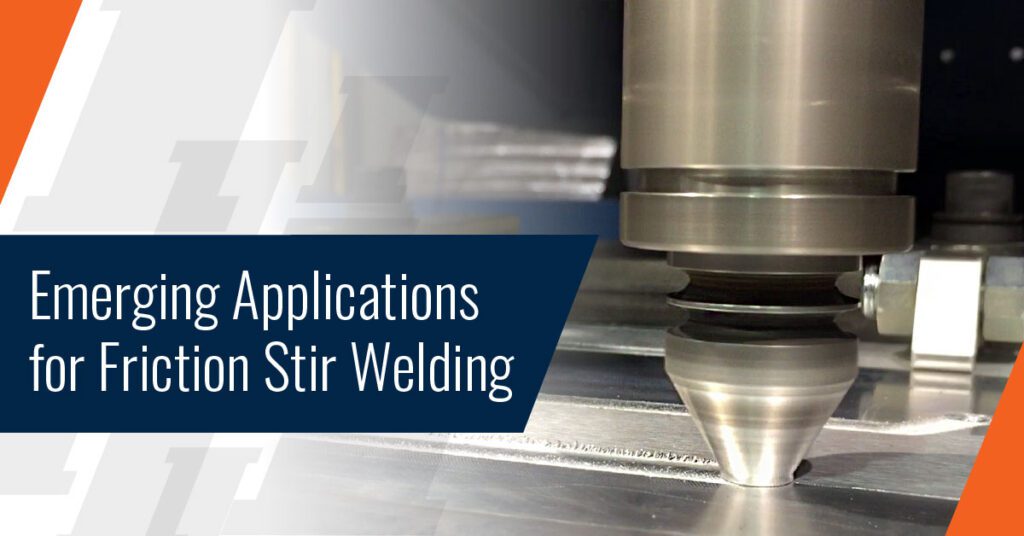
Friction Stir Welding (FSW) has earned its position as the technology of choice for established applications such as heat exchangers and battery enclosures. But did you know that FSW is an emerging innovation in the manufacture of bus bars and rail cars?
Friction Stir Welding (FSW)
Friction Stir Welding (FSW) is a solid-state technology that uses a specialized, non-consumable pin tool. Its profiled spindle “stirs” throughout the joint of two materials, generating heat below the melting point under effective parameters. This type of joining method plasticizes them together as a single solid material after cooling.
Friction Stir Welding has many advantages that allow manufacturers to create quality components:
- Low distortion with minimal extrusions due to lower temperatures.
- High mechanical strength and fatigue stress resistance compared to conventional welding.
- The weld zone (HAZ) grain structure of stir-welded metals is finer than that of its parent materials.
- It can join many “non-weldable” aluminum alloys.
Due to these advantages, manufacturers have developed new industrial applications for friction stir weld methods.
Recent Breakthrough Developments in Friction Stir Welding (FSW) for Industrial Applications
While FSW is no stranger to the manufacturing industry, it is emerging as a promising technology for new entrants, such as bus bars and aluminum extrusions for rail cars.
Friction Stir Welding (FSW) for Bus Bars – Enhancing Electrical Conductivity
Bus bars are used in electrical systems, such as electric vehicles, to carry electricity. They are made from bimetallic applications consisting of aluminum and copper. While methods such as soldering, clamping, and fusion welding have been used, Friction Stir Welding takes the innovation further.
Manufacturers use FSW for its many benefits in manufacturing bus bars, including:
- Solid-state Process—FSW, like all friction welding processes, does not melt the materials being joined. Thus, the resulting application is of forged quality, retaining most, if not all, of the parent material’s properties.
- Bimetallic Joining – FSW is especially well suited for the joining of dissimilar metals, like aluminum and copper, that may be impossible to join with other welding techniques.
- High Tensile Strength – FSW is largely defect-free with a higher tensile strength performance and fatigue resistance than fusion welding.
Friction Stir Welding (FSW) in Aluminum Extrusions for Rail Cars – Precision and Durability
Rail cars are commonly produced from longitudinal aluminum extrusions through fusion welding. However, the high heat input of fusion welding often leads to distortion, added costs, and the need for post-processing to achieve the desired cosmetic appearance.
Today, friction stir welding is becoming a standard worldwide for rail car manufacturing due to its low distortion, reduced costs, and eco-friendly advantages.
Why Choose FSW Over Traditional Welding Methods?
- Unmatched Joint Strength & Durability – The solid-state joining process creates stronger, more reliable welds with a fine grain structure that has a high resistance to fatigue strength.
- Optimized for Lightweighting – FSW enhances structural integrity while supporting lightweight materials, making it ideal for modern rail applications.
- Leak-Proof Performance – Because of its solid-state joining, FSW eliminates porosity, solidification cracking, and hot cracking, making the welded area have similar strength and fatigue characteristics to the parent material.
- Precision & Consistency – Controlled frictional heat, forging pressure, and process automation deliver repeatable, high-quality welds.
- Increased Efficiency – A single FSW pass can replace multiple MIG welding passes, streamlining production for thicker sections.
- Safer, Cleaner Process – FSW does not leave a weld splatter because of the low heat required.
- Eco-Friendly Advantage – No consumables like gas or filler wire are required, and FSW produces zero weld fumes—helping manufacturers meet strict health and safety standards.
And now, our strategic partnership with STIRTEC further enhances our FSW capabilities by utilizing the latest in FSW technology to deliver streamlined and faster production.
Additionally, MTI brings decades of experience in designing and building specialized FSW machines across a wide range of industries—including aerospace—where we’ve met some of the most demanding manufacturing standards.
Let’s Make Something Extraordinary Together!
Friction Stir Welding uses continue to grow through innovation. We are committed to your success through finding unique and tailored solutions that meet your specific needs. With the joining forces of our partner STIRTEC, MTI is able to offer more advanced FSW solutions. Ready to get started? Contact us to start your next project!
